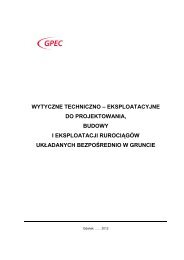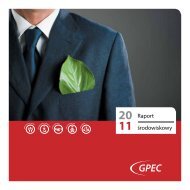Consolidated Financial Statements of the Stadtwerke Leipzig Group ...
Consolidated Financial Statements of the Stadtwerke Leipzig Group ...
Consolidated Financial Statements of the Stadtwerke Leipzig Group ...
You also want an ePaper? Increase the reach of your titles
YUMPU automatically turns print PDFs into web optimized ePapers that Google loves.
As from October 2008, <strong>the</strong> EEX has been allowing<br />
negative prices. This can lead to a price having<br />
to be paid for feeding in power if <strong>the</strong> gas and<br />
steam turbine plant is operated to guarantee <strong>the</strong><br />
security <strong>of</strong> supply <strong>of</strong> district heating. This risk<br />
did not occur in 2009 and is largely excluded by<br />
<strong>the</strong> sale <strong>of</strong> amounts <strong>of</strong> electricity.<br />
The demand for natural, unprocessed timber<br />
has risen markedly in <strong>the</strong> catchment areas <strong>of</strong> our<br />
biomass power stations. At times our contracting<br />
parties are unable to meet <strong>the</strong>ir contractual<br />
delivery obligations. In order to ensure a secure<br />
supply for <strong>the</strong> Bisch<strong>of</strong>ferode and Piesteritz<br />
biomass power stations, <strong>the</strong>refore, it is necessary<br />
to buy timber pro rata at <strong>the</strong> currently high<br />
regional price level.<br />
Pr<strong>of</strong>it and valuation risks for <strong>the</strong> biomass power<br />
stations (in excess <strong>of</strong> <strong>the</strong> economic risks already<br />
covered in <strong>the</strong> balance sheet) can arise as a result<br />
<strong>of</strong> a larger than expected rise in <strong>the</strong> price <strong>of</strong><br />
timber or smaller (in terms <strong>of</strong> volume) steam deliveries<br />
to third parties. On <strong>the</strong> o<strong>the</strong>r hand, <strong>the</strong>re<br />
are opportunities from a fur<strong>the</strong>r improvement<br />
in our own wood procurement, <strong>the</strong> stabilisation<br />
<strong>of</strong> procurement costs, and higher payments for<br />
cogenerated electricity.<br />
Wholesale Energy Trading: The value <strong>of</strong> <strong>the</strong><br />
portfolios in own-account trading and portfolio<br />
management is subject to an electricity- and<br />
gas-price risk arising from open positions.<br />
The prices <strong>of</strong> heating contracts – and also <strong>the</strong><br />
bilateral medium-term gas contracts – are tied to<br />
<strong>the</strong> price <strong>of</strong> oil, resulting in an oil price risk for<br />
<strong>the</strong> company. The methods used for <strong>the</strong> day-today<br />
monitoring <strong>of</strong> <strong>the</strong> market risk to <strong>the</strong> open<br />
positions in <strong>the</strong> individual portfolios include a<br />
value-at-risk approach and different scenario<br />
calculations and stress tests.<br />
Credit risks: In energy trading, <strong>Stadtwerke</strong><br />
<strong>Leipzig</strong> GmbH is primarily confronted with <strong>the</strong><br />
credit risk. Ano<strong>the</strong>r potential risk is that prices<br />
may change when energy deliveries have to be<br />
replaced or resold, e.g. if a supplier or customer<br />
defaults. A fur<strong>the</strong>r risk arises from <strong>the</strong> loss <strong>of</strong><br />
receivables outstanding if a trading partner<br />
becomes insolvent.<br />
To minimise such risks, every business or<br />
trading partner is assigned a credit limit using<br />
internal balance sheet and creditworthiness<br />
assessments or based on external credit ratings;<br />
compliance is monitored daily. Fur<strong>the</strong>rmore, <strong>the</strong><br />
creditworthiness <strong>of</strong> trading partners is subject<br />
to permanent review. Standardised contracts<br />
<strong>of</strong> <strong>the</strong> European Federation <strong>of</strong> Energy Traders<br />
(EFET) are generally used to limit credit risks in<br />
<strong>of</strong>f-board trading.<br />
Energy Marketing: Competition in district<br />
heating comes from substitutes such as heating<br />
oil and liquid gas. Since <strong>the</strong> gas market was<br />
liberalised in 2007, competition has increased<br />
considerably and has been developing much<br />
faster as a result <strong>of</strong> experience on <strong>the</strong> electricity<br />
market. Competition is expected to intensify in<br />
<strong>the</strong> future. Sales opportunities in <strong>the</strong> field <strong>of</strong> gas<br />
supplies for new buildings are lower due to <strong>the</strong><br />
Renewable Energies Heat Act (EEWärmeG).<br />
Medium-sized business customers are reacting<br />
in an increasingly price-sensitive way. The<br />
related higher requirements demand an increasingly<br />
pr<strong>of</strong>essional approach. In our dealings<br />
with business and private customers, we counter<br />
sales risks by active distribution and marketing<br />
activities. Newly designed products counter <strong>the</strong><br />
restrictions on unilateral price changes in <strong>the</strong><br />
electricity and gas field demanded by <strong>the</strong> courts.<br />
28 | Annual <strong>Financial</strong> <strong>Statements</strong> <strong>of</strong> <strong>Stadtwerke</strong> <strong>Leipzig</strong> GmbH





